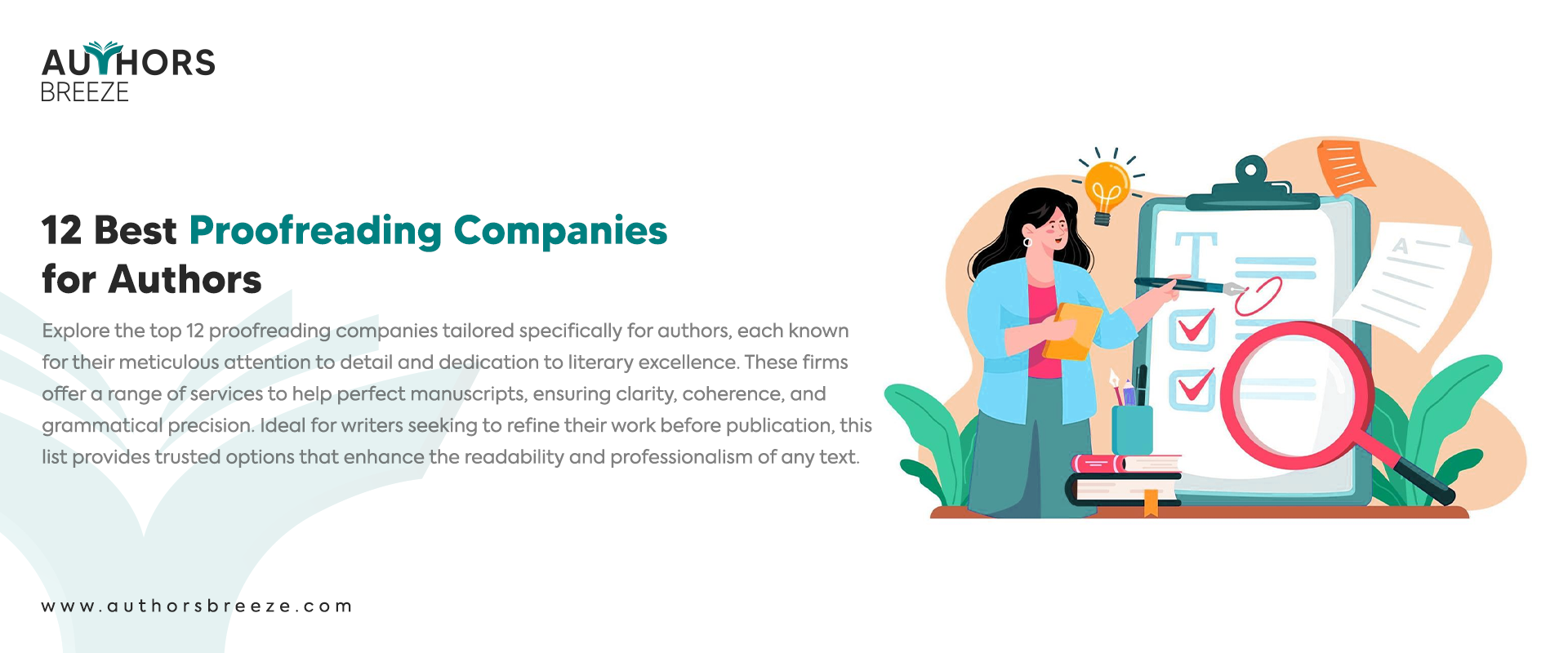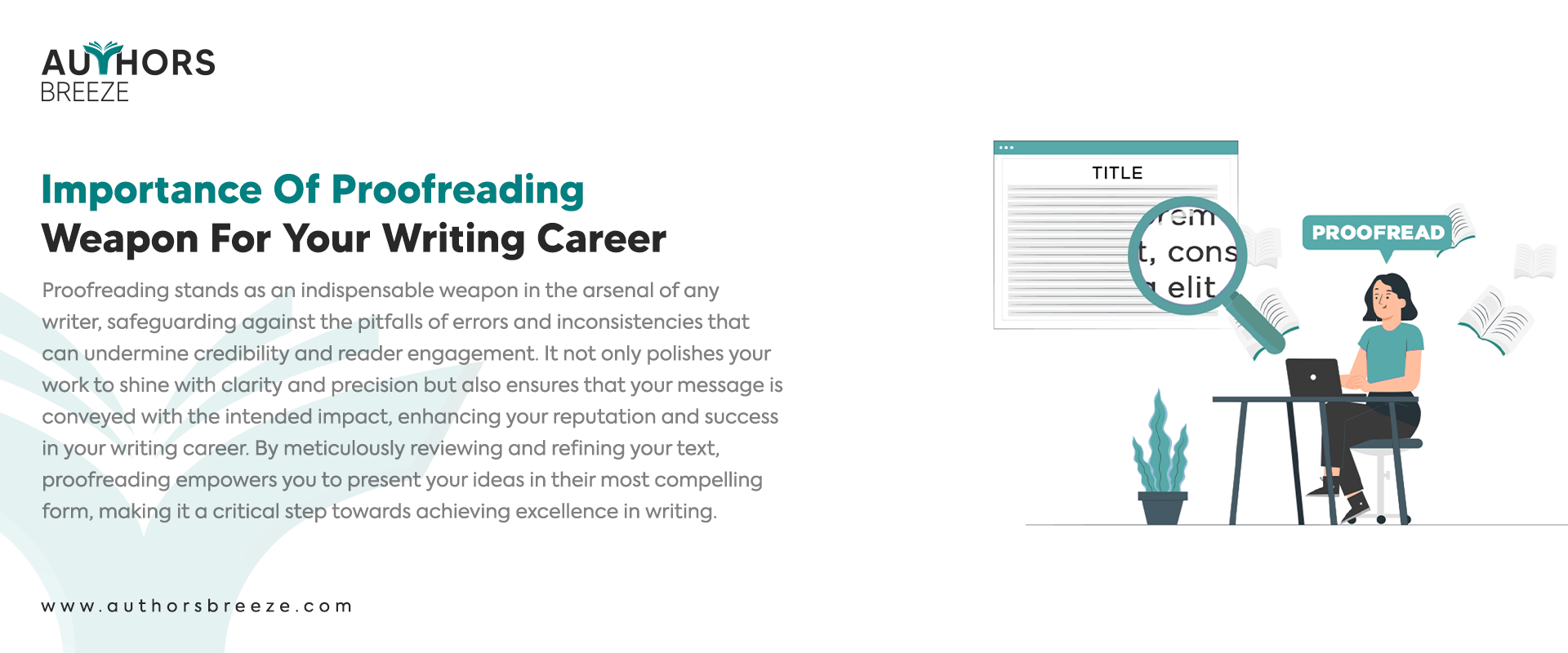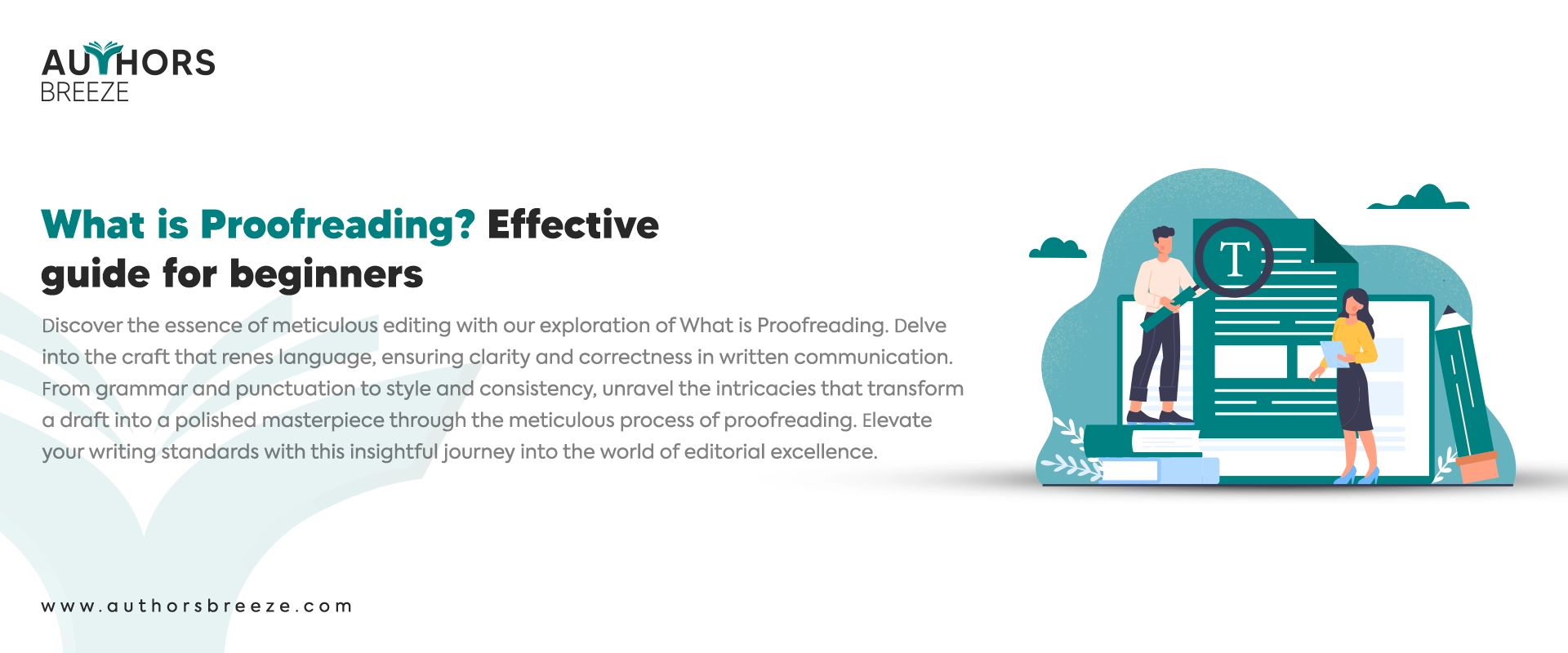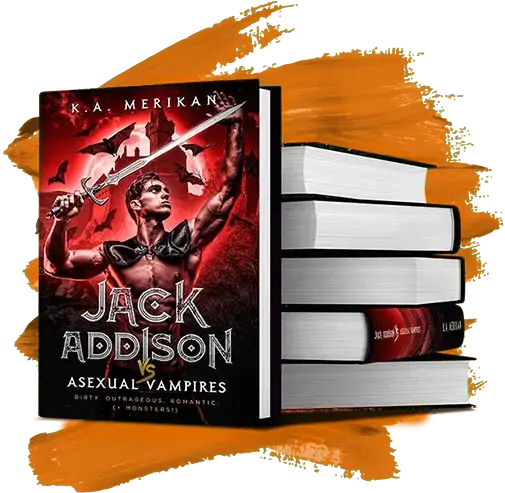Don’t Have Time to Read? Listen to this Article Instead!
Key Takeaways: How to Become a Proofreader?
- A proofreader ensures that the written content is error-free and easy to understand.
- To be a good proofreader, you must pay attention to detail and know the language well.
- There are different types of proofreaders, such as legal, academic, technical, etc., each with specific tasks.
- Proofreading is the last step of the writing process. Editing makes broader improvements to the writing.
- Having certification and experience can enhance your chances of getting hired as a proofreader.
Start Your Path to Book Perfection
You can be a proofreader but still need experts to make your book manuscript flawless. Make your book publish-ready with our professionals.
Introduction to Become a Proofreader
Do you know who is a proofreader? Have you ever seen a small mistake? A wrong word or a comma in the wrong place? When reading something? That is where proofreaders come in. They are the ones who work behind the scenes to make sure that every word is perfect. Proofreaders make sure that your documents are free of errors before you publish them.
In this blog, we will explore proofreading and whatever has anything to do with it. We will uncover why it is important and how you can become a professional proofreader. If you love playing with language and want to get better at it, or you are curious about making a job out of it, then this guide will help you. This blog will give you insights on how you can start on the path to becoming a professional proofreader. So, get ready as we jump into the pool of proofreading.
The Importance Of Proofreading
Proofreading might seem like a small task to many. However, the importance of proofreading is highlighted time by time by Authors Breeze. It is the final polish of a piece of writing before you publish a book or any other content. Imagine reading a book or an article that is filled with problematic language, such as:
- Spelling Mistakes
- Grammatical Errors
- Unclear Sentences
Would you like to read such a piece of content? Of course not. No one wants to drink water from a broken cup. The same goes for written content. It can be annoying for the reader. That is where proofreading comes in. Here are some of the top reasons why proofreading is essential.
Brings Clarity
Proofreaders carefully check for errors and make sure that the message being conveyed is crystal clear. They fix a lot of things, which include:
- Typing Errors
- Grammar Mistakes
- Unclear Sentence Structures
All of this helps make the text clear and easy to understand.
Adds Professionalism
Proofreading is the one fine tool that maintains professionalism. Do not think that only a business report or a website should be professional. It goes for books as well, no matter fiction, nonfiction, or any other genre. Polished writing reflects positively on the author or the organization. It shows that you care about quality. This can be highly beneficial for you and your work.
Improves Credibility
It also helps improve the credibility of the content. Accuracy is paramount in all types of work, such as:
- Books
- Blogs
- Articles
It is so important that even a tiny mistake can cause people to doubt the credibility of your work. Therefore, you have to carefully review the content to maintain accuracy and keep the information honest and trustworthy.
What Does a Proofreader Do?
A proofreader is a word detective. They search for mistakes in writing and make it better. There are many types of proofreaders, such as:
- Legal Proofreader
- Academic Proofreader
- Document Proofreader
- Technical Proofreader
- Content Proofreader
- Scientific Proofreader
The one who proofreads a book for publication is called a book proofreader. Proofreaders have many tasks and responsibilities on them. Below are some of their functions.
Check Spelling Mistakes
The first and most important part of their work is to check for spelling mistakes. They look at every word to make sure that there are no typing mistakes. They fix any words that are spelled wrong. Examples can include if a word has misplaced alphabets. It also involves words that are almost similar but have different meanings, such as specially and especially.
Identify Grammar Mistakes
After that, they fix all grammar mistakes in the document or work. They spot errors such as the ones where a sentence does not make sense. The grammar mistakes can also include punctuation errors such as the wrong use of “quotation marks” and more. It is their responsibility to make sure that the final piece of writing sounds right and is easy to understand.
Improve Sentence Structures
Third, proofreaders make sentences better. They rearrange words to make them clearer and easier to read. They fix any parts that are hard to understand.
Maintain Consistency
Apart from the errors and mistakes, they also make sure that everything looks the same. They check that the writing styles and spellings are consistent throughout the whole document. This makes the writing look professional as well. Here are some of its examples:
- If “color” is used in one section, they make sure not to spell it as “colour” in another section.
- In case the document starts with a formal tone, they maintain that tone consistently.
- If headings are bold and in the center of one section, they format it the same way in other sections, too.
Fix Format
In addition to all of the above tasks, they have one more. It is the responsibility of a proofreader to know how the writing looks on the page. They make sure everything is perfect, such as:
- Headings
- Fonts
- Spacing
This makes the document look nice and easy to read.
Their work does not end here. They also can give advice, which makes writing and publishing even better. They suggest changes to make the writing stronger or clearer. This could include rearranging paragraphs or removing unnecessary information.
Let Your Book Meet Formatting Standards
Ensure your book looks impeccable on every page, whether it is a paperback, ebook, or both.
What is Proofreading?
So, what is proofreading? Proofreading is the final checkup of a piece of writing before publishing or sharing it with everyone. It is all about finding and fixing mistakes. This process ensures that the text is perfect in terms of:
- Clarity
- Correctness
- Refinement
At its core, proofreading is the careful reading of a document to spot errors in:
- Spelling
- Grammar
- Punctuation
- Formatting
It is just like being a detective. You search for hidden mistakes in grammar and punctuation. It helps fix the errors that might have been neglected in the writing and editing, which can affect the book publishing process.
Proofreaders are the ones who proofread. They pay attention to detail and make sure that every word is spelled correctly and that sentences are grammatically perfect. In addition, they also check for consistency in things such as:
- Spelling
- Punctuation
- Writing Style
They do this to ensure that the text is perfect and flows smoothly.
In addition, proofreading is more than just fixing mistakes. It is about improving the overall quality of the written work. Proofreaders may suggest changes for several things to improve clarity and readability such as:
- Sentence Structure
- Word Choice
- Phrasing
So, the aim of proofreading is to make the work error-free and professional. It helps effectively convey the intended message to the reader. Proofreading is highly important as it ensures that written content is of the highest quality.
Difference Between Proofreading and Editing
It is important to understand the difference between proofreading and editing if you are a:
- Writer
- Editor
- Author
Both of them have distinct purposes, but both make written content better. Let’s see how both differ in the writing process.
Proofreading is the last step in the process, and it includes checking for small mistakes such as:
- Spelling
- Grammar
- Punctuation
Proofreaders make sure that the writing is perfect before you share or publish it.
There are different types of editing, and all have just one purpose: to have a deeper look at the writing. Editors aim to make the written content better overall. They fix various things, which include how:
- The writing is organized
- It flows
- Easy it is to understand
They might suggest changes to different things, such as:
- Words
- Sentences
- Overall clarity
Editors also give feedback to help improve the content itself. Making arguments stronger or adding more information, whereas proofreading catches surface-level mistakes.
While editing makes the writing better overall. Both are important steps to make the written work look professional and polished.
Don’t Let Errors Hold Your Book Back
Our editing experts refine your narrative, enhance your voice, and perfect your prose. Your story has potential; let’s unlock it together!
Skills Required To Become a Proofreader
Good proofreading needs a mix of skills to make sure writing is:
- Correct
- Clear
- Consistent
It is essential to know these if you want to become an online proofreader or a freelance proofreader. There are many proofreading skills that you will need if you want to become a professional proofreader. Below are some of the proofreading requirements:
Attention to Detail
If you want to learn to proofread, then the first thing you should do is pay attention to detail. It is vital for proofreading. It means looking at everything, including:
- Word
- Sentence
- Paragraph
Look at everything very carefully to find even the smallest mistakes. Proofreaders have to be very careful so they can catch things such as:
- Spelling mistakes
- Grammar errors
- Parts that do not look right
This skill helps make sure the final piece is free of mistakes and looks perfect.
Language Proficiency
When you work as a proofreader, it is your responsibility to know the language you are proofreading. It is extremely essential as you need to understand all the little rules of that language. This includes:
- Grammar
- Vocabulary
- How words fit together
Apart from that, you also have to know the meaning of the words of the language. It does not matter if it is English, French, or another language for this matter. You need to be really good at it to find mistakes and fix them.
Grammar and Punctuation Knowledge
If you want to become a proofreader, you should know about grammar and punctuation. You need to follow these basic rules to write a book. In addition, you should understand things such as:
- How sentences should be structured
- When to use commas or semicolons
This helps make sure that the written content makes sense and looks right.
Additional Requirements
To become a proofreader, you will need some extra qualifications. First is a proofreader certification. This can help show that you have the right skills for the job. The second thing is to have proofreading experience. It is important as this could help proofreading companies to hire you. With both certification and experience, you will be well-prepared to take on the role of a proofreader. You can also make a proofreading portfolio to showcase your skills.
Strategies for Efficient Proofreading
Break it down
To make your proofreading process easy, break it into smaller parts. This can make it easier to catch mistakes. Instead of trying to check the whole document at once, focus on one paragraph at a time. This allows you to give each section your full attention and ensures that you do not miss any mistakes.
Read Aloud
Reading your writing aloud can help you find mistakes that you might miss when reading silently. Hearing your words spoken aloud can make mistakes more visible. When you listen to your writing, you can identify many errors, such as:
- Awkward Phrasing
- Grammar Errors
- Misspelling
Take Breaks
Proofreading can be tiring, so it is important to take breaks when you need them. This allows you to rest and recharge so that you can come back with fresh eyes and full energy. This can help you catch more errors and maintain your focus throughout the process. So, do not forget to take breaks and give yourself time to relax.
Frequently Asked Questions
How do I become a better proofreader?
Here are some effective ways to proofread writing:
- Do not only trust spelling and grammar tools
- Focus on finding one mistake at a time
- Read each word slowly and carefully
- Break the text into smaller parts to check
- Circle punctuation marks to check them
- Read the writing in reverse order
- Keep track of the mistakes you often make
How do you succeed as a proofreader?
A good proofreader uses their ability to notice even tiny mistakes to make sure the text has no errors. Apart from that, they also use their skills to manage time effectively. They handle all their work and finish it on schedule.
What qualifications do I need to be a proofreader?
The qualifications you need depend on what area you want to work in. For instance, if you want to be a proofreader for academics or scientists, you usually need a university degree in a related subject. But for many proofreading jobs, having experience and showing you're good at it matters more than having specific qualifications.
Conclusion
To become a professional proofreader, you have to have the right skills. An expert proofreader works hard and pays close attention to details. Proofreaders do many things, which include:
- Check spelling and grammar mistakes
- Fix how sentences are written
- Keep everything consistent
- Make sure the layout looks good
To be good at this job, you have to have some necessary things, including:
- Language
- Experience
- A Certification
By practicing and learning, you can not only be better at proofreading but also become a professional proofreader. If you have more questions or want to hand over this task to an existing professional or proofreading company, then you can connect with Authors Breeze. They have skilled professionals who can make all your documents or manuscripts error-free.
Publish Your Book Confidently
We empower authors to bring their stories to life and share them with the world. Your story deserves to be told. Let’s make it happen together.






